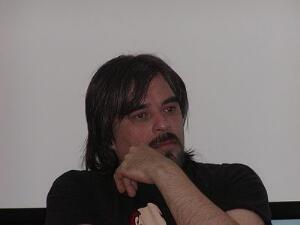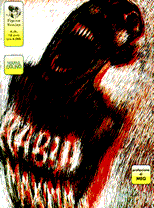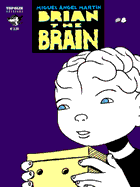Doing a Dirty Job: Interview with Topolin's editor Jorge Vacca
by anna battista
 "Everything started in 1995 when we decided to publish Psychopatia Sexualis by Miguel Angel Martín, a well-known Spanish author. There is freedom of expression, hence no censorship for what regards the press in Italy, but there is a law that states that every typographer has got to send three copies of whatever he prints to the police headquarter within three months. When the typographer saw the pages of Psychopatia Sexualis he got scared and sent them before binding them, to the police. The copies arrived to the public prosecutor who decided to preventively seize the book. It is only possible to preventively seize three copies of a book, not necessarily the whole run, but in our case the prosecutor seized the whole run of 2,000 copies, though all the books were unbound. I never understood if this was legal or illegal. From then on other seizures followed," Jorge Vacca, editor of the publishing house Topolin Edizioni, based in Milan, explains the audience gathered at the Museum of Modern Art in Pescara, Italy, during a lecture against censorship.
"Everything started in 1995 when we decided to publish Psychopatia Sexualis by Miguel Angel Martín, a well-known Spanish author. There is freedom of expression, hence no censorship for what regards the press in Italy, but there is a law that states that every typographer has got to send three copies of whatever he prints to the police headquarter within three months. When the typographer saw the pages of Psychopatia Sexualis he got scared and sent them before binding them, to the police. The copies arrived to the public prosecutor who decided to preventively seize the book. It is only possible to preventively seize three copies of a book, not necessarily the whole run, but in our case the prosecutor seized the whole run of 2,000 copies, though all the books were unbound. I never understood if this was legal or illegal. From then on other seizures followed," Jorge Vacca, editor of the publishing house Topolin Edizioni, based in Milan, explains the audience gathered at the Museum of Modern Art in Pescara, Italy, during a lecture against censorship.
 When we talk about censorship, we often think of banned books and of banned writers, but censorship casts its black shadow everywhere, often on any kind of entertainment - from literature to comics, from cinema to music. We all know the story of the Tribunal of the Inquisition, we all know that once there were lists of books banned by the authorities and possibly burnt. As many of you will remember texts such as The Arabian Nights or James Joyce's Ulysses were banned. But today we want to focus our attention on a particular publishing house, Topolin Edizioni, which, since 1995, fought with the Italian authorities to set its products free from a draconian censorship. "Censorship is the imposition of a few over the many of a prevailing opinion, it means to treat the citizens as subnormal people, to tell them what they have to do and what they have to think," Jorge Vacca states, "In the '70s the Italian band CCCP used to sing 'produci, consuma, crepa' (produce, consume, die): a person must respect a certain order of things in our world, must respect canons established by the minority and aimed at the majority. Censorship is methodical and happens all over the world, in some countries there are particular ways of censoring something, in others there are other ways, but censorship is still alive. When we were preparing Psychopatia Sexualis, I never thought such a thing could have ever happen in Italy, especially because I come from Argentine, a country where there has been the military dictatorship, where censorship manifested itself in extreme ways."
When we talk about censorship, we often think of banned books and of banned writers, but censorship casts its black shadow everywhere, often on any kind of entertainment - from literature to comics, from cinema to music. We all know the story of the Tribunal of the Inquisition, we all know that once there were lists of books banned by the authorities and possibly burnt. As many of you will remember texts such as The Arabian Nights or James Joyce's Ulysses were banned. But today we want to focus our attention on a particular publishing house, Topolin Edizioni, which, since 1995, fought with the Italian authorities to set its products free from a draconian censorship. "Censorship is the imposition of a few over the many of a prevailing opinion, it means to treat the citizens as subnormal people, to tell them what they have to do and what they have to think," Jorge Vacca states, "In the '70s the Italian band CCCP used to sing 'produci, consuma, crepa' (produce, consume, die): a person must respect a certain order of things in our world, must respect canons established by the minority and aimed at the majority. Censorship is methodical and happens all over the world, in some countries there are particular ways of censoring something, in others there are other ways, but censorship is still alive. When we were preparing Psychopatia Sexualis, I never thought such a thing could have ever happen in Italy, especially because I come from Argentine, a country where there has been the military dictatorship, where censorship manifested itself in extreme ways."
Miguel Angel Martín's Psychopatia Sexualis had to go through a hellish journey before being released from seizure. "In 1998 there was a search at our publishing house," Jorge recounts, "and the police seized all our products. In the case of Brian the Brain, again by Miguel Angel Martín, I think they found too many kids together. Brian the Brain is the story of a child born without skullcap, he's the result of a genetic experiments lab. Brian's an outcast because his brain sticks out of his head, but his brain is also the symbol of his intelligence. But specialists accused Brian the Brainof instigating pedophilia. Another book seized in that occasion was Sesso Istruzioni per l'Abuso (Sex, Instruction to Abuse of It) by a Spanish writer, Alvarez Rabo, they considered it as a manual for 'sexual abuse', whereas it was a manual to ironically 'abuse of sex'. Also the title A Child's Life, an autobiography of American writer Phoebe Gloeckner, who tells the story of her tragic childhood when she was abused by her stepfather, was seized. During the trials we had to go through, we were supported by associations, intellectuals and musicians who helped collecting money to pay the legal expenses by organising events and gigs. The first trial went fine, but now there are other three trials. The charges are rather serious and defamatory, they are instigation to murder, instigation to suicide, instigation to pedophilia, obscenities and gruesome images. Today the books I mentioned are still available because, after seven years, it was possible to release them from seizure. Now we only need to wait for three trials. But we'll go on and on, indeed our motto is 'somebody must do the dirty job'."
In the history of banned comics there have been various authors who, in various parts of the world, became emblematic cases. One is Mike Diana, a guy from Florida who was detained for his drawings and put in the maximum security section of the Pinellas County prison while awaiting sentencing. The terms of his sentence were particularly troubling when considering that all he did was draw things. He was sentenced to three years probation with the following terms - he had to pay a $3000 fine, undergo psychological evaluation, maintain full-time employment, perform 8 hours of community service per week, have no contact with anyone under the age of 18, take a course in 'Journalism Ethics' at his own expense, and could not draw any other similar material even for his own personal use. His material, admitted sick and twisted at the highest levels of those terms, did have political and social commentary in it, and thus could not meet the established legal litmus test defining "obscenity". His punishment was not for breaking any existing obscenity laws, it was simply for drawing things that offended people.
"When Mike ended up in court," Jorge remembers, "the Comic Book Legal Defend Fund, a commission for the defence of freedom of expression for comic writers in the United States, supported him, but the judge sentenced him to stay away from schools, but also to stay away also from pencils and computers, in a nutshell, he was denied to do his job. Mike is constantly controlled: FBI agents can search his house any day at any time. One day they search it at 8 a.m., another day at 3 p.m., another at midnight, and they control if there are pencils, pens, felt-tipped pens, or even paper, all the things he cannot touch. This is a unique case and now Mike works as a porn actor. Another case of extreme censorship involves Argentinean authors Alberto & Enrique Breccia and Hector Oesterheld. With their style they changed the way of creating comics and published in 1968, a comic book about the life of Che Guevara. Years after, when there was the military dictatorship, the authors had to burn all the copies of the book and all the original drawings. Oesterheld was kidnapped and Alberto Breccia left only one copy of the book buried in his garden. Two days after, Oesterheld became one of the 30,000 Argentinean 'desaparecidos', together with his five daughters. Breccia dug the copy of the book out after seven years, when the dictatorship was over. It was then that he started living again and today the works of these authors are published in Latin America and in a few European countries. I know that in Great Britain there are laws that censor particular topics: for example, a book by Robert Crumb entitled in Italy Io e le Donne (Me and Women), original title My Problems with Women, can't be published in Great Britain in the same way as A Child's Life by Phoebe Gloeckner cannot be published over there. American copies of Gloeckner's book were sent in Great Britain to be sold during a comics fair, but were seized by the customs."
 New titles currently listed in the Topolin catalogue include Snuff 2000, The Space Between and Brian the Brian #8 by Miguel Angel Martín and El Dié by Lucas (Jorge Luís Pereira), a comic about the incredible adventures of ex-footballer Diego Maradona. "At Topolin we published 25 or 26 books," Jorge explains, underlining "a few title are sold out, such as the anthology of Charles Bukowski's tales Portami il tuo amore/Non c'è niente da fare'(Bring Me Your Love/There's No Business) with drawings by Robert Crumb, published in 2000. From the next year we will have to start reprinting the sold out titles, in the meantime, we will have to go on publishing old stuff and new authors. There are thirty new authors we would like to publish and we have also an imprint totally dedicated to female writers. The imprint is called Topina and includes Vita da bambina (A Child's Life) by Phoebe Gloeckner and Massima Rabbia (Rabia Maxima) by Spanish Maria Colino. We're going to release in this imprint also another book, Heptameron, and a collection of postcards, Arcangeli, both by Maria Colino. There are thousands of authors I like, one of my favourites is Winsor McCay, who created Little Nemo in 1906-1907. He de-construed comics and did things that even today are really rare to see. We can say that with Little Nemo, modern comics were born. Among the other authors I like there are also Alberto Breccia and Hugo Pratt. I would personally like to publish thousands of authors: there is one thing I still haven't managed to do and that's publishing everything by Alberto Breccia, even the more obscure comics or the more experimental stuff. I do love comics, comics have a very important narrative value: they are an intelligent reading choice because it's not easy to read contemporarily drawings and words, mix them together and create a continuum, connecting the frames one to another. Besides, I've always said that the danger in comics is that white space that separates one frame from the other because it's in that space that you put your ideas. In comics there is not a director like in films, you're the director, hence, the danger in a comic book is that famous white line that separates the frames, that white line can cause disasters."
New titles currently listed in the Topolin catalogue include Snuff 2000, The Space Between and Brian the Brian #8 by Miguel Angel Martín and El Dié by Lucas (Jorge Luís Pereira), a comic about the incredible adventures of ex-footballer Diego Maradona. "At Topolin we published 25 or 26 books," Jorge explains, underlining "a few title are sold out, such as the anthology of Charles Bukowski's tales Portami il tuo amore/Non c'è niente da fare'(Bring Me Your Love/There's No Business) with drawings by Robert Crumb, published in 2000. From the next year we will have to start reprinting the sold out titles, in the meantime, we will have to go on publishing old stuff and new authors. There are thirty new authors we would like to publish and we have also an imprint totally dedicated to female writers. The imprint is called Topina and includes Vita da bambina (A Child's Life) by Phoebe Gloeckner and Massima Rabbia (Rabia Maxima) by Spanish Maria Colino. We're going to release in this imprint also another book, Heptameron, and a collection of postcards, Arcangeli, both by Maria Colino. There are thousands of authors I like, one of my favourites is Winsor McCay, who created Little Nemo in 1906-1907. He de-construed comics and did things that even today are really rare to see. We can say that with Little Nemo, modern comics were born. Among the other authors I like there are also Alberto Breccia and Hugo Pratt. I would personally like to publish thousands of authors: there is one thing I still haven't managed to do and that's publishing everything by Alberto Breccia, even the more obscure comics or the more experimental stuff. I do love comics, comics have a very important narrative value: they are an intelligent reading choice because it's not easy to read contemporarily drawings and words, mix them together and create a continuum, connecting the frames one to another. Besides, I've always said that the danger in comics is that white space that separates one frame from the other because it's in that space that you put your ideas. In comics there is not a director like in films, you're the director, hence, the danger in a comic book is that famous white line that separates the frames, that white line can cause disasters."
Comics aren't static images living on a sheet of paper, they do live in the imagination of the readers and often on the big screen, like Miguel Angel Martín's Snuff 2000, which was turned into an 8 minutes shortcut directed by Borja Crespo. Snuff 2000 has been in programme at cinematographic festivals and shortcut festivals all over Europe and its DVD is also being produced. "The shortcut Snuff 2000 was created from three different stories by Martín," Jorge recounts, "The stories were about two completely amoral characters who, as a job, film a movie called Snuff, a film in which death is the main character. The two characters shoot the movie well-bearing in their minds that death is also the client who buys the films for its own sexual arousal. Snuff 2000 will be soon released in Italy, but it was already previewed in Milan, Naples and Pescara. At present, we are also producing the Italian version of the film since the original version is in Spanish with English subtitles."
Topolin recently opened in Milan a very special gallery La Cueva, which is not your average art gallery, it's much more a "No-Art" gallery. "La Cueva is a little gallery managed by myself and Giovanni Peritore, Topolin's 'No-Art' director. We opened it a year and a half ago, it's just a small cellar in the centre of Milan, but we use it to present books, CDs, shortcuts or to organise exhibitions. Usually we do an exhibition a month, up to now we've done 18 exhibitions. Now there's an exhibition called 'I Colori della Mente' by Ivano Vorra, from October on there will be 'Casa Howhard' by Roberto Baldazzini. We had artists with different backgrounds or with completely different styles exhibiting at the Cueva, that's why we call it a 'No-Art gallery', because we're against the art system; art is prostitution, it means having contacts with people in the art business, and we're against all this."
 Though in Italy there are a few independent comics publishing houses, things are not that easy because of distribution problems. "Majors and independent publishing houses are two different things. Here in Italy there are only two majors, Bonelli and Disney. Lots of independent publishing houses had to close down because of the local distribution which is on one side in the hands of Marvel, and on the other in the hands of a big publishing house, Star Comics," Jorge explains. "Both are interested in promoting their products and that's where the difficulty is. For example, Psychopatia Sexualis was released from seizure after seven years and four trials, but distributors aren't interested in it because they say they don't know if it's safe to sell it. Brian the Braindoes not even carry an 18 certificate, but it has got the same problem even though it sells 4,000 copies per issue and I don't think there are other independent houses in Italy which sell so many copies of one comic. I might say that at Topolin we didn't only have to fight against censorship: even though the judge said we were right, the distributors don't want to know anything about our products, so we had to create an alternative system to distribute and sell our books. Now we work more with those book distributors who deliver books in social centres or with particular bookshops, or we sell the stuff ourselves. 80% of the copies of our books are sold on stalls during concerts or at comics fairs and that's because distributors don't want to sell our products, our job is even harder because we don't only have to product the books and organise events and exhibitions, but we ourselves have to go in different Italian towns and promote our books. We recently did a tour with Italian band 99 Posse, they played in 100 towns and we were always present with our stall during all the gigs. In this way we created a different system and Topolin grew up by word of mouth."
Though in Italy there are a few independent comics publishing houses, things are not that easy because of distribution problems. "Majors and independent publishing houses are two different things. Here in Italy there are only two majors, Bonelli and Disney. Lots of independent publishing houses had to close down because of the local distribution which is on one side in the hands of Marvel, and on the other in the hands of a big publishing house, Star Comics," Jorge explains. "Both are interested in promoting their products and that's where the difficulty is. For example, Psychopatia Sexualis was released from seizure after seven years and four trials, but distributors aren't interested in it because they say they don't know if it's safe to sell it. Brian the Braindoes not even carry an 18 certificate, but it has got the same problem even though it sells 4,000 copies per issue and I don't think there are other independent houses in Italy which sell so many copies of one comic. I might say that at Topolin we didn't only have to fight against censorship: even though the judge said we were right, the distributors don't want to know anything about our products, so we had to create an alternative system to distribute and sell our books. Now we work more with those book distributors who deliver books in social centres or with particular bookshops, or we sell the stuff ourselves. 80% of the copies of our books are sold on stalls during concerts or at comics fairs and that's because distributors don't want to sell our products, our job is even harder because we don't only have to product the books and organise events and exhibitions, but we ourselves have to go in different Italian towns and promote our books. We recently did a tour with Italian band 99 Posse, they played in 100 towns and we were always present with our stall during all the gigs. In this way we created a different system and Topolin grew up by word of mouth."
Jorge Vacca was recently in Pescara to talk about his experience with censorship during the local literature festival. After the festival he went back to Milan to organise the Cueva calendar and work on new projects. "We're busy at Cueva since our exhibition calendar is already full till September 2004, though I'm sure the calendar will soon become longer. We also have plans for an independent record label because we love music and we also have an utopian idea, that of publishing also literature. In a way the Bukowski book was an experiment, the utopian first title for a Topolin literature imprint. There are so many authors which are not published in Italy because publishing house editors think the book might not sell, but if you don't print it, it's obvious that the book won't sell and in this way many authors will be forgotten. We would do with books what we already do with comics, we would choose an author, publish his or her book and then follow the book. In ten years' time we published just twenty comics titles, two per year in a way, but our agenda is to publish a book and then promote it, introduce it to people, educate people to our products. The first title we would like to publish for our literature imprint would be a book entitled Severino Di Giovanni - el idealista de la violencia (Severino Di Giovanni - the idealist of violence) by Osvaldo Bayer, a Uruguayan writer. Severino Di Giovanni was an abruzzese anarchist who emigrated in Argentina in 1923. He was anarchist at such a point that he even put bombs in anarchic centres apart from in police stations and banks. He was captured while he was going to visit his lover, Josefina Scarfò, who at the time was only 15 years old and was the sister of the anarchist brothers Alejandro and Paulino Scarfò. I really do hope that we will manage to publish this title one day."
The hope for Topolin Edizioni (and for its fans!) is for things to get even better than they are now and, obviously, to be able to publish, apart from its incendiary comics, also incendiary novels and biographies. For the time being, there are still a few trials to be won, there are still a few fights in the name of freedom of expression to be fought, but we're pretty sure that with its verve, energy and stamina Topolin will prevail over anyone and anything.
Topolin Edizioni: www.topolin.it
Snuff 2000: www.snuff2000.com
La Cueva address: Via Vigevano 3, Milano, tel. (int.code +) 02 84 63 946, email: info@topolin.it
Comics images and Topolin edizioni logo taken from the site www.topolin.it
Copyright (c) 2005 erasing clouds |
Picture of Jorge Vacca at the 2003 Festival delle Letterature, Pescara, Italy, by Nicola Battista. |